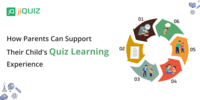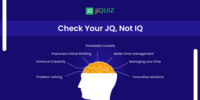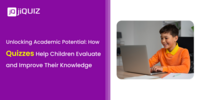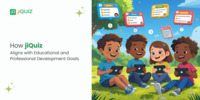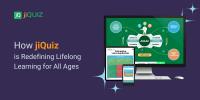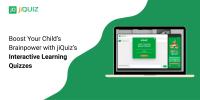- Jun 11, 2025
- Updates
- 459
Share this post on:
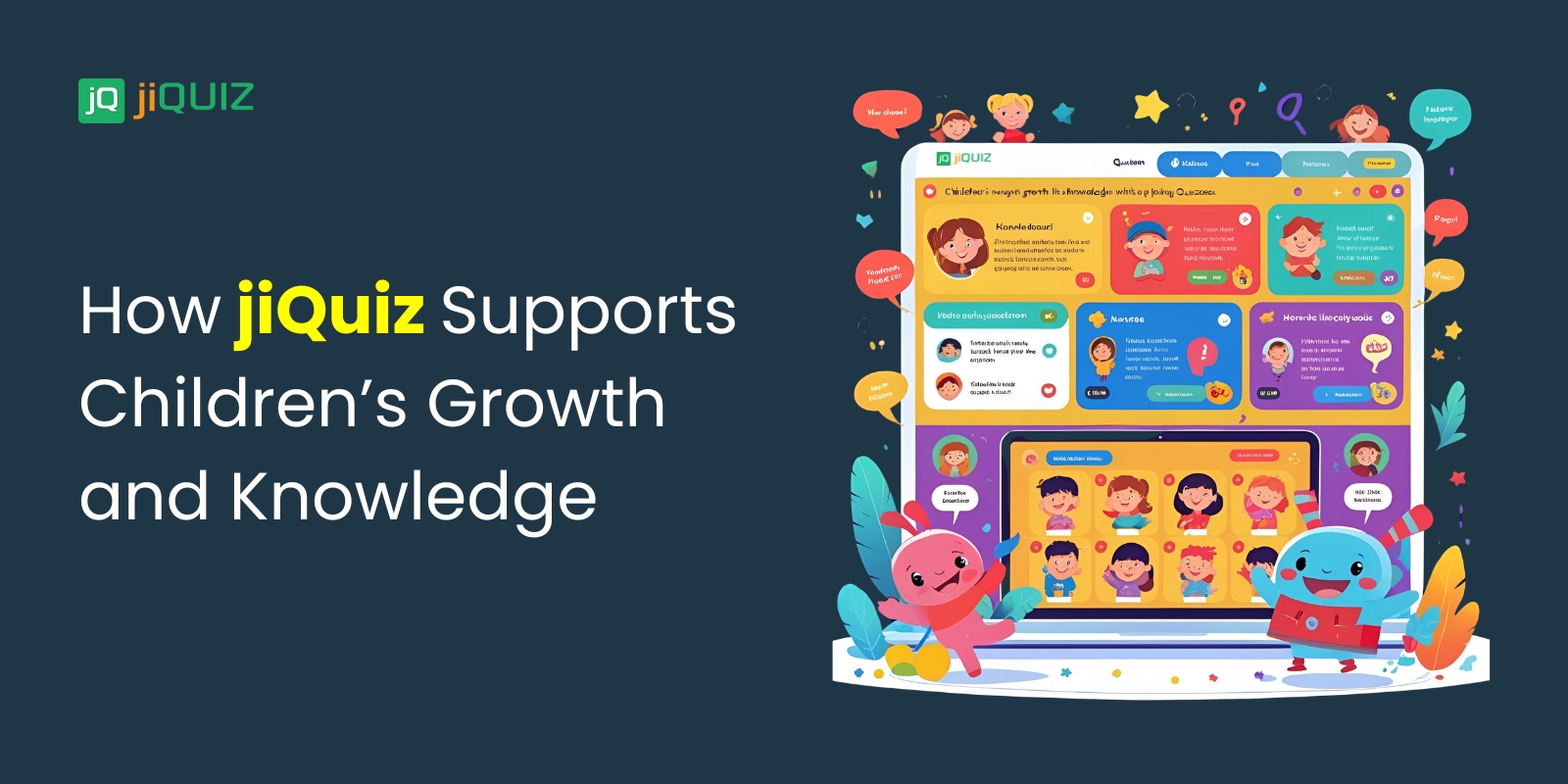
In today’s fast-changing world, it’s very important to help children enjoy learning. Old methods like memorizing facts and reading boring textbooks are no longer enough. Education today should be fun, interactive, and fit each child’s unique way of learning. That’s where jiQuiz comes in. This platform is made to support learning in a fun and smart way. But how does jiQuiz help kids grow and learn better? In this blog, we’ll look at its features, how it works, and why it’s good for children of all ages.
What is jiQuiz and Why is it Different?
jiQuiz is an online learning platform that utilizes gamification to make learning fun and engaging. It’s more than just a collection of quizzes; it's a curated environment where children can explore a vast array of subjects, from science and mathematics to language arts and history, all through interactive quizzes, challenges, and reward systems. What truly sets jiQuiz apart is its focus on personalized learning. It adapts to each child’s pace and understanding, ensuring they're challenged appropriately without feeling overwhelmed. Instead of a one-size-fits-all approach, jiQuiz understands that every child learns differently.
The Power of Gamification: Why Kids Love Learning with jiQuiz
The core principle behind jiQuiz’s success is gamification. Let's break down why this is so effective for children's learning:
- Intrinsic Motivation: Traditional learning methods often rely on extrinsic motivation – grades, praise from parents. While these can be useful, they don’t always cultivate a genuine desire to learn. Gamification taps into intrinsic motivation, the inherent satisfaction derived from achieving goals and mastering challenges.
- Immediate Feedback: Children need to know how they’re doing. jiQuiz provides instant feedback on answers – correct or incorrect – allowing children to learn from their mistakes immediately. This constant feedback loop reinforces understanding and promotes retention.
- Reward Systems and Progression: Earning points, badges, and unlocking new levels creates a sense of accomplishment and encourages continued engagement. The feeling of progression motivates children to tackle increasingly challenging material.
- Competition (Optional & Controlled): While jiQuiz primarily focuses on individual learning, some elements of friendly competition (leaderboards, challenge modes) can be introduced to further stimulate interest – always within a supportive and age-appropriate context. Parents can usually control these features.
- Reduced Anxiety: The playful nature of jiQuiz lowers the pressure often associated with traditional testing, making learning a more positive experience. Mistakes become opportunities for learning, not sources of shame.
Key Features of jiQuiz and Their Impact on Learning
Let's look at specific features and how they contribute to children's growth:
- Adaptive Learning Paths: The platform's algorithm assesses a child’s understanding based on their responses. It then adjusts the difficulty and content accordingly, ensuring they're always learning at the optimal level. If a child struggles with a concept, the system provides additional practice and easier questions. If they excel, they are presented with more advanced material.
- Diverse Subject Coverage: jiQuiz boasts a wide range of subjects catering to various age groups and interests. This exposure broadens a child’s knowledge base and sparks curiosity. From learning about the solar system to practicing basic arithmetic, the possibilities are vast.
- Visually Engaging Content: The platform uses colorful graphics, animations, and interactive elements to make learning visually appealing. This is particularly important for younger children who are still developing their reading skills.
- Age-Specific Content: Content is categorized and designed for different age groups, ensuring the material is appropriate and challenging without being overwhelming. There are sections for preschoolers, elementary students, middle schoolers, and even introductory material for older children.
- Progress Tracking for Parents: Parents can monitor their child’s progress, identify areas where they might be struggling, and gain insights into their learning preferences. This allows for targeted support and encouragement.
- Customizable Quizzes (Often Available): Many versions of jiQuiz allow teachers and parents to create custom quizzes tailored to specific learning objectives or curriculum requirements. This flexibility makes it a valuable tool for both home and classroom learning.
- Multiple Question Types: jiQuiz incorporates various question formats – multiple-choice, true/false, fill-in-the-blanks, matching – to cater to different learning styles and keep children engaged.
- Offline Accessibility (Potential Feature): Some platforms offer the option to download quizzes for offline access, allowing children to learn even without an internet connection.
The Psychological Principles at Play
jiQuiz isn't just about fun and games; it's built on solid psychological principles:
- Constructivism: Constructivism is a learning theory that emphasizes the active role of the learner in constructing their own understanding. jiQuiz, with its interactive quizzes and adaptive learning paths, encourages children to actively engage with the material and build their own knowledge.
- Zone of Proximal Development (ZPD): Developed by Lev Vygotsky, the ZPD refers to the gap between what a child can do independently and what they can achieve with guidance. jiQuiz’s adaptive learning system operates within this zone, providing just the right level of challenge and support.
- Spaced Repetition: The platform often incorporates spaced repetition techniques, where concepts are revisited at increasing intervals. This strengthens memory and promotes long-term retention.
- Positive Reinforcement: The reward system and immediate feedback are forms of positive reinforcement, which are highly effective in motivating children to learn and persevere.
Benefits for Different Age Groups
- Preschoolers (Ages 3-5): Introduces basic concepts like colors, shapes, letters, and numbers in a fun and engaging way. Focuses on building foundational skills and fostering a love of learning.
- Elementary School (Ages 6-11): Reinforces core curriculum subjects like math, science, language arts, and social studies. Develops critical thinking skills and problem-solving abilities.
- Middle School (Ages 12-14): Prepares students for more advanced academic challenges. Encourages independent learning and exploration of diverse topics.
- Older Children (Ages 15+): Can be used for test preparation (SAT, ACT), exploring specialized subjects, or simply satisfying curiosity.
How Parents Can Maximize the Benefits of jiQuiz
- Encourage Exploration: Let your child explore different subjects and topics that interest them.
- Set Realistic Goals: Help your child set achievable goals and celebrate their progress.
- Provide Support: Be available to answer questions and provide encouragement when needed.
- Limit Screen Time (Moderation is Key): While jiQuiz is a valuable learning tool, it's important to maintain a healthy balance with other activities.
- Engage in Discussions: Talk about what your child is learning and encourage them to share their knowledge.
Conclusion
jiQuiz offers a unique and effective approach to children’s education. By combining the power of gamification with sound psychological principles, it transforms learning from a chore into an enjoyable and rewarding experience. More than just imparting knowledge, jiQuiz cultivates a lifelong love of learning – a gift that will serve children well throughout their lives. Give your child the opportunity to thrive – explore jiQuiz today!

